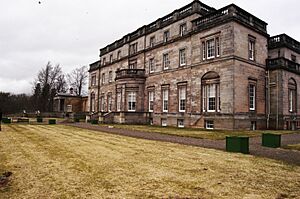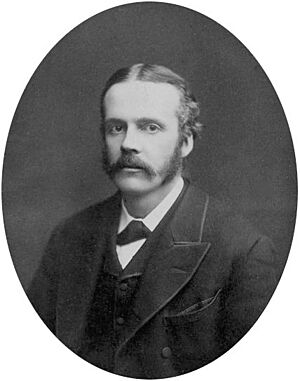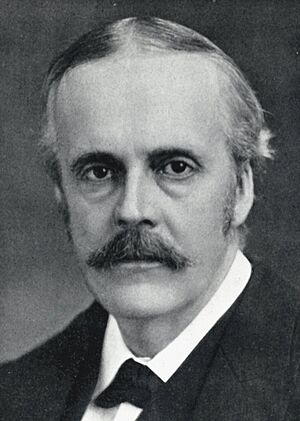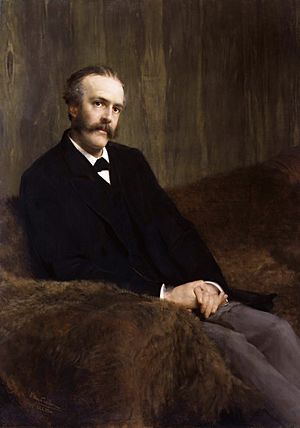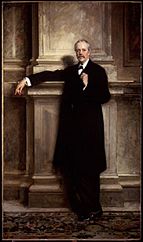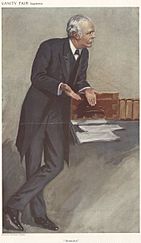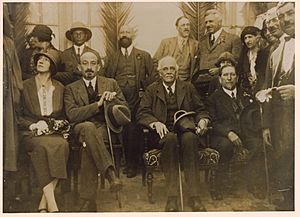Arthur Balfour facts for kids
Quick facts for kids
The Earl of Balfour
|
|||||||||||||||||||||||||||||||||||||||||||||
|---|---|---|---|---|---|---|---|---|---|---|---|---|---|---|---|---|---|---|---|---|---|---|---|---|---|---|---|---|---|---|---|---|---|---|---|---|---|---|---|---|---|---|---|---|---|
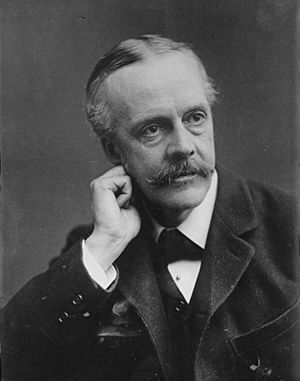
Balfour in 1902
|
|||||||||||||||||||||||||||||||||||||||||||||
| Prime Minister of the United Kingdom | |||||||||||||||||||||||||||||||||||||||||||||
| In office 12 July 1902 – 4 December 1905 |
|||||||||||||||||||||||||||||||||||||||||||||
| Monarch | Edward VII | ||||||||||||||||||||||||||||||||||||||||||||
| Preceded by | The Marquess of Salisbury | ||||||||||||||||||||||||||||||||||||||||||||
| Succeeded by | Sir Henry Campbell-Bannerman | ||||||||||||||||||||||||||||||||||||||||||||
|
|||||||||||||||||||||||||||||||||||||||||||||
|
|||||||||||||||||||||||||||||||||||||||||||||
|
|||||||||||||||||||||||||||||||||||||||||||||
|
|||||||||||||||||||||||||||||||||||||||||||||
| Personal details | |||||||||||||||||||||||||||||||||||||||||||||
| Born |
Arthur James Balfour
25 July 1848 Whittingehame House, East Lothian, Scotland |
||||||||||||||||||||||||||||||||||||||||||||
| Died | 19 March 1930 (aged 81) Woking, Surrey, England |
||||||||||||||||||||||||||||||||||||||||||||
| Resting place | Whittingehame Church, Whittingehame | ||||||||||||||||||||||||||||||||||||||||||||
| Political party | Conservative | ||||||||||||||||||||||||||||||||||||||||||||
| Parents |
|
||||||||||||||||||||||||||||||||||||||||||||
| Alma mater | Trinity College, Cambridge | ||||||||||||||||||||||||||||||||||||||||||||
| Signature | |||||||||||||||||||||||||||||||||||||||||||||
Arthur James Balfour, also known as Lord Balfour, was a British politician from the Conservative Party. He was born on July 25, 1848, and passed away on March 19, 1930. He served as the Prime Minister of the United Kingdom from 1902 to 1905.
Later, as Foreign Secretary, he played a key role in issuing the Balfour Declaration of 1917. This important statement supported the idea of a "home for the Jewish people" in Palestine.
Balfour first became a Member of Parliament (MP) in 1874. He became well-known as the Chief Secretary for Ireland. In this role, he worked to calm unrest among farmers and helped landowners. He was against Irish Home Rule, believing Ireland should either stay fully part of the UK or become completely independent.
He led the Conservative Party in the House of Commons from 1891. He served under his uncle, Lord Salisbury, who was also a Prime Minister. Balfour was known as a great speaker, though he found the daily tasks of managing the party a bit boring.
After his time as Prime Minister, Balfour continued to hold important positions. He was the First Lord of the Admiralty during World War I and later the Foreign Secretary. He died at 81, having spent a large fortune he inherited. He never married.
Contents
Arthur Balfour's Early Life and Family
Arthur Balfour was born at Whittingehame House in East Lothian, Scotland, on July 25, 1848. He was the oldest son of James Maitland Balfour and Lady Blanche Gascoyne-Cecil. His father was a Scottish MP, and his mother came from the important Cecil family.
His mother was the daughter of the 2nd Marquess of Salisbury and sister to the 3rd Marquess of Salisbury, who would later become Prime Minister. Arthur Balfour's godfather was the famous Duke of Wellington.
Arthur was the third of eight children, with four brothers and three sisters. He went to Grange Preparatory School and then Eton College. He later studied moral sciences at Trinity College, Cambridge, graduating in 1869. His younger brother, Francis Maitland Balfour, became a famous embryologist.
Balfour never married. His household was managed by his unmarried sister, Alice. He had a long friendship with Lady Elcho, who later became Countess of Wemyss and March. He was also a key member of a social and intellectual group called The Souls.
Starting His Political Career
In 1874, Arthur Balfour was elected as a Conservative Member of Parliament (MP) for Hertford. He held this seat until 1885. From 1885 to 1906, he represented Manchester East.
In 1878, he became the private secretary to his uncle, Lord Salisbury, who was then the Foreign Secretary. Balfour traveled with Salisbury to the Congress of Berlin. This was his first experience in international politics, dealing with the end of the Russo-Turkish conflict.
At the same time, Balfour became known for his writings. His book Defence of Philosophic Doubt (1879) showed he could be a philosopher. He balanced his time between politics and academic interests. While some thought he was just dabbling in politics, he was actually becoming a very involved politician. He was ambitious, good at judging political situations, skilled at negotiating, and avoided conflicts between groups. He also kept strong ties with his uncle, Lord Salisbury.
After the 1880 general election, Balfour became more active in Parliament. He joined a group called the "Fourth Party" with Lord Randolph Churchill and others. This group was known for criticizing older Conservative leaders.
Working in Lord Salisbury's Governments
Chief Secretary for Ireland
In 1885, Lord Salisbury made Balfour the President of the Local Government Board. The next year, he became Secretary of State for Scotland and joined the Cabinet. These roles helped him learn about government. In 1887, he became Chief Secretary for Ireland. Many people criticized this choice, especially Irish politicians, because they thought he was not strong enough.
However, Balfour surprised everyone. He strictly enforced the Crimes Act. During the Mitchelstown Massacre in 1887, police fired at protestors, killing three people. Balfour defended the police in Parliament, earning him the nickname "Bloody Balfour." His firm leadership helped change his reputation.
Balfour was against Home Rule for Ireland, seeing it as a false kind of Irish nationalism. He worked with Joseph Chamberlain's Liberal Unionists to support Unionist groups in Ireland. He also helped poor people by creating the Congested Districts Board for Ireland in 1890.
Balfour believed that economic problems, not just nationalism, were the real issues in Ireland. He thought that if violence stopped and land was sold to tenants, Irish nationalism would not threaten the United Kingdom. His policy was called "to kill home rule with kindness." He greatly expanded land sales to Irish tenants. This policy helped many farmers own their land, and tensions in the countryside decreased.
Leading Roles in Parliament
Between 1886 and 1892, Balfour became one of the best public speakers of his time. His speeches were logical and convincing, attracting a growing audience.
When W. H. Smith died in 1891, Balfour became First Lord of the Treasury and Leader of the House of Commons. After his party lost power in 1892, he spent three years in opposition. When the Conservatives returned to power in 1895, Balfour again became Leader of the House and First Lord of the Treasury.
He helped pass a law that improved local government in Ireland in 1898. He also took part in important discussions about foreign and domestic issues. During Lord Salisbury's illness in 1898, Balfour was in charge of the Foreign Office. He handled talks with Russia about railways in China.
Balfour was part of the cabinet that dealt with the Transvaal negotiations in 1899. When the war started badly, he was one of the first to realize that Britain needed to use its full military strength. He led the House firmly, but some criticisms from 1896 reappeared.
Becoming Prime Minister
When Lord Salisbury resigned on July 11, 1902, Balfour became Prime Minister. Everyone in the Unionist party approved. He took office around the same time as the coronation of King Edward VII and the end of the South African War.
Foreign Policy and Domestic Challenges
As Prime Minister, Balfour and his foreign secretary, Lord Lansdowne, improved relations with France. This led to the Entente Cordiale in 1904, an agreement that ended long-standing conflicts between the two countries. During this time, the Russo-Japanese War also took place. Britain, an ally of Japan, almost went to war with Russia after the Dogger Bank incident. Balfour mostly let Lansdowne handle foreign policy, as he was busy with problems at home.
Balfour had known Chaim Weizmann, a Zionist leader, since 1906. He was against how Jews were treated in Russia and increasingly supported Zionism, which aimed to create a Jewish homeland in Palestine. However, in 1905, he supported the Aliens Act 1905, which aimed to control Jewish immigration from Eastern Europe.
A big challenge for Balfour was the debate over tariff reform. Joseph Chamberlain wanted to put taxes on imported goods, especially from Germany and the United States. He argued this would help the British economy, strengthen ties with the Empire, and raise money for social programs. However, many people, including some Conservatives, strongly opposed this idea because it could raise food prices.
Balfour tried to find a middle ground, suggesting tariffs to punish countries that had tariffs against Britain. But this wasn't enough for either side. Chamberlain resigned from the Cabinet in 1903 to campaign for tariff reform. Other ministers also resigned, weakening Balfour's government.
Balfour resigned as Prime Minister in December 1905. He hoped the Liberal leader, Campbell-Bannerman, would struggle to form a strong government. However, Campbell-Bannerman succeeded. The Conservatives then suffered a huge defeat in the 1906 election, and Balfour even lost his own seat. He soon returned to Parliament and continued to lead the opposition. He resigned as party leader in 1911.
Key Achievements as Prime Minister
Historians generally credit Balfour with important achievements in several areas:
- The Education Act 1902: This law modernized the school system in England and Wales. It provided money for schools run by the Church of England and the Catholic Church. While it angered some groups at the time, it was praised later for its success.
- The Land Purchase (Ireland) Act 1903: This law helped buy out most of the Anglo-Irish landowners. The British government bought millions of acres and sold them to tenants with low payments over many years. This greatly reduced tensions in the Irish countryside.
- Military and Foreign Policy: Balfour created the Committee of Imperial Defence (1904), which helped the Army and Navy plan better together. He also supported Jackie Fisher's naval reforms. The Entente Cordiale with France in 1904 was also a major success, forming a strong alliance that proved important in World War I.
Balfour faced criticism for some decisions, like allowing Chinese workers to be brought to South Africa, which opponents called "Chinese slavery." He also struggled to unite his party over the tariff debate, which ultimately led to their defeat in the 1906 election.
Balfour was personally open to women getting the right to vote. However, he recognized the strong political opposition. He believed that most women did not want the vote. Despite efforts from women's suffrage activists, including his sister-in-law Lady Betty Balfour, it wasn't until 1918 that some women in the United Kingdom gained the right to vote.
Later Political Career
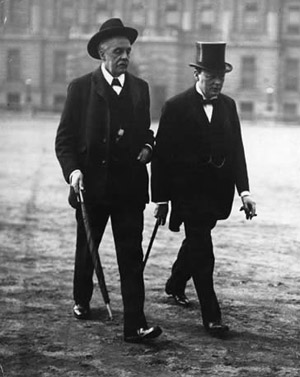
After the 1906 election, Balfour remained the leader of the Conservative Party. He decided to use the House of Lords, which had many Conservative members, to block or change laws proposed by the Liberal government. This led to a major constitutional crisis, especially over David Lloyd George's "People's Budget" in 1909.
This crisis eventually led to the Parliament Act 1911, which limited the House of Lords' power to delay bills. After the Conservatives lost two more general elections in 1910, Balfour resigned as party leader in late 1911 and was replaced by Bonar Law.
However, Balfour remained an important figure. When the Unionists joined Asquith's coalition government in May 1915, Balfour became First Lord of the Admiralty. In December 1916, he became Foreign Secretary in Lloyd George's new government.
His time as Foreign Secretary is most famous for the Balfour Mission, a key visit to the United States in 1917 to strengthen alliances. It is also known for the Balfour Declaration of 1917. This was a letter supporting the idea of a "national home for the Jewish people" in Palestine, which was then part of the Ottoman Empire.
Balfour resigned as Foreign Secretary after the Versailles Conference in 1919. He continued to serve in the government as Lord President of the Council. In 1921–22, he represented the British Empire at the Washington Naval Conference. He also proposed a plan for settling war debts, known as the Balfour Note, but it was not accepted.
On May 5, 1922, Balfour was given the title Earl of Balfour and Viscount Traprain. This allowed him to sit in the House of Lords. He returned to the Cabinet in 1925 as Lord President of the Council and served until 1929. With 28 years of government service, Balfour had one of the longest ministerial careers in modern British politics.
Last Years and Legacy
Lord Balfour was generally healthy until 1928 and played tennis regularly. However, he began to suffer from circulatory problems in late 1928, which eventually led to his death. He passed away at his brother Gerald's home in Woking on March 19, 1930, at the age of 81.
At his request, he did not have a public funeral. He was buried on March 22 at Whittingehame next to his family. His title passed to his brother Gerald. Interestingly, his obituaries in major newspapers at the time did not mention the Balfour Declaration, for which he is now most famous outside Britain.
Personality and Interests
Early in his career, some thought Balfour was just playing at politics. However, he proved to be a very capable leader. He was known for his calm and detached attitude. A famous quote attributed to him is: "Nothing matters very much and few things matter at all."
Balfour was interested in philosophy and the study of dialects. He even donated money to help create The English Dialect Dictionary. He was also a fan of football and supported Manchester City F.C..
Artistic Contributions
After World War I, there was a discussion about the design of headstones for British war graves. Balfour submitted a design for a cross-shaped headstone. However, his design was not chosen. Critics said it was "extraordinarily ugly" and would not create a "restful dignity" in cemeteries. The commission chose a different standard headstone that allowed more space for inscriptions.
In Popular Culture
Balfour sometimes appears in books and TV shows:
- He was the subject of two parody novels, Clara in Blunderland (1902) and Lost in Blunderland (1903).
- In the TV series Upstairs, Downstairs, he promotes a character named Richard Bellamy.
- He has been portrayed by actors in TV productions like Jennie: Lady Randolph Churchill and Edward the Seventh.
- A fictional version of Balfour appears in the science fiction romance The Angel of the Revolution.
Honors and Recognition
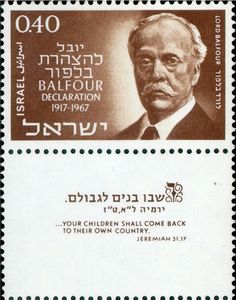
Balfour's legacy is mixed among historians. Some praise his achievements, like the Education Act, the Irish Land Purchase, and the Committee of Imperial Defence. Others point to his political defeats, especially the split in his party over trade policy and the massive election loss in 1906.
Several places are named after him:
- Balfouria, a village in northern Israel.
- Many streets in Israel.
- The town of Balfour in Mpumalanga, South Africa.
- The Lord Balfour Hotel in Miami Beach, Florida.
He received many honors during his life:
- He was made a Deputy Lieutenant of Ross-shire in 1880.
- He joined the Privy Council of the United Kingdom in 1885.
- He was appointed to the Order of Merit in 1916.
- He became Chancellor of Cambridge University in 1919.
- He was made a Knight Companion of the Order of the Garter in 1922.
- He was awarded the Estonian Cross of Liberty.
- He received the Freedom of the City from Dundee, Haddington, and Edinburgh.
He also received honorary degrees from several universities:
| Country | Date | School | Degree |
|---|---|---|---|
| 1909 | University of Liverpool | Doctor of Laws (LL.D) | |
| 1912 | University of Sheffield | Doctor of Laws (LL.D) | |
| 1917 | University of Toronto | Doctor of Laws (LL.D) | |
| 1921 | University of Wales | Doctor of Letters (D.Litt.) | |
| 1924 | University of Leeds | Doctor of Laws (LL.D) |
Images for kids
See also
 In Spanish: Arthur Balfour para niños
In Spanish: Arthur Balfour para niños
- Balfour Declaration
- Balfour Declaration of 1926
- Palm Sunday Case
 | Selma Burke |
 | Pauline Powell Burns |
 | Frederick J. Brown |
 | Robert Blackburn |


